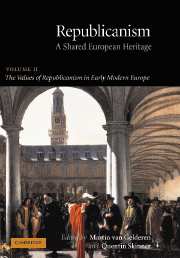Book contents
- Frontmatter
- Contents
- Contents of Volume I
- Acknowledgments
- Introduction
- Part I Republicanism and Political Values
- 1 Classical Liberty and the Coming of the English Civil War
- 2 Empire and Liberty: A Republican Dilemma
- 3 Republicanism and Toleration
- 4 The Mechanisation of Virtue: Republican Rituals in Italian Political Thought in the Sixteenth and Seventeenth Centuries
- 5 From Virtue to Politeness
- 6 From Civism to Civility: D'Holbach's Critique of Republican Virtue
- Part II The Place of Women in the Republic
- Part III Republicanism and the Rise of Commerce
- Bibliography
- Contributors
- Index of Names of Persons
- Index of Subjects
5 - From Virtue to Politeness
Published online by Cambridge University Press: 11 January 2010
- Frontmatter
- Contents
- Contents of Volume I
- Acknowledgments
- Introduction
- Part I Republicanism and Political Values
- 1 Classical Liberty and the Coming of the English Civil War
- 2 Empire and Liberty: A Republican Dilemma
- 3 Republicanism and Toleration
- 4 The Mechanisation of Virtue: Republican Rituals in Italian Political Thought in the Sixteenth and Seventeenth Centuries
- 5 From Virtue to Politeness
- 6 From Civism to Civility: D'Holbach's Critique of Republican Virtue
- Part II The Place of Women in the Republic
- Part III Republicanism and the Rise of Commerce
- Bibliography
- Contributors
- Index of Names of Persons
- Index of Subjects
Summary
Whilst republicanism can be thought of in largely institutional terms, recent Anglophone historical scholarship has stressed a republican preoccupation with more extensive concerns, with what might be called the moral economy of a society. So understood, its scope included the military, legal and economic arrangements of a society and the dynamic interaction of these through time as they shaped the moral personalities of its citizens. Moreover, this view suggested, republicanism was a political language. It could – for those using it – become broadly constitutive of attempts to understand the dynamic of political phenomena. Aspects of its analysis could therefore be applied by writers who accepted the monarchical institutions of modern European states (e.g. Montesquieu 1748, and, surprisingly, Burke 1991: 248). The language of republicanism largely contributed to our understanding of the complexity of the historical causes operating on the political. Conceiving of the state as an essentially human response to secular change forced engagement with issues of causality in a way that thinking of the state in terms of the languages of covenant, jurisprudence, custom, grace or providence – to mention the main early-modern contenders – did not (Pocock 1971a, 1972).
The language of republicanism thus became important in articulating and responding to the complex political processes affecting the early modern state. These were traditionally anathematised by thinkers with a republican programme – the rapid increase in commercial activity, the growth in the powers of the executive and the acquisition of empire.
- Type
- Chapter
- Information
- RepublicanismA Shared European Heritage, pp. 85 - 106Publisher: Cambridge University PressPrint publication year: 2002
- 5
- Cited by



